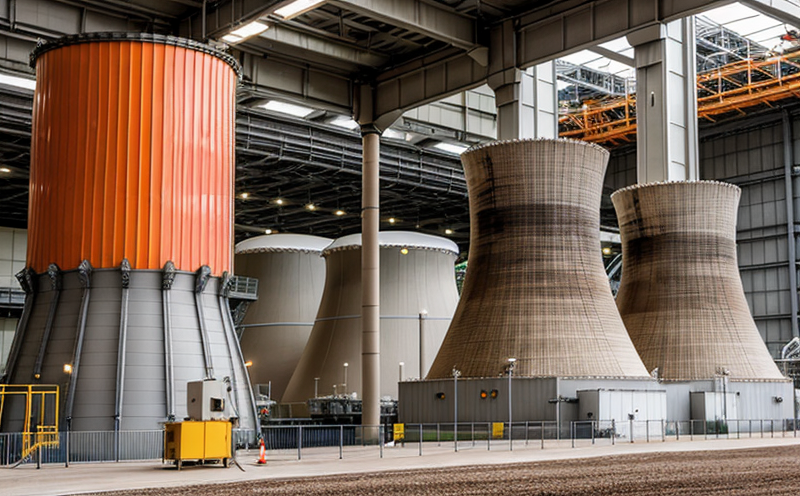ISO 16529 Testing of Nuclear Piping Integrity
The ISO 16529 standard provides a method for assessing the integrity of nuclear piping materials and components, which is critical in ensuring safety and reliability within nuclear power plants. This testing protocol evaluates the mechanical properties, material characteristics, and potential flaws that could affect the operational life and safety of these crucial systems.
The process begins with thorough specimen preparation, where samples are cut from the actual pipe or component to be tested under strict ISO 16529 guidelines. The integrity assessment involves a combination of non-destructive testing (NDT) methods such as ultrasonic testing (UT), radiographic examination (RT), and magnetic particle inspection (MPI). These techniques help identify any defects or anomalies that could compromise the structural soundness.
For detailed mechanical property evaluation, tensile tests are conducted according to ISO standards. Specimens undergo stress until fracture, providing critical information on yield strength, ultimate tensile strength, and elongation at break. This data is essential for understanding how the material will behave under operational loads in a nuclear environment.
The testing process also includes hydrostatic pressure testing, which assesses the piping’s ability to withstand high-pressure conditions typical of reactor systems. This test ensures that the pipes can safely handle the necessary hydraulic demands without failure or leakage. Furthermore, creep and fatigue tests simulate long-term operational stresses, providing insight into the material's resistance to gradual deformation over time.
The results from these various tests are meticulously recorded and analyzed according to ISO 16529 requirements. Detailed reports document any defects found during NDT, as well as the mechanical properties of the specimens tested. This comprehensive approach ensures that only materials and components meeting stringent international standards are accepted into use within nuclear power plants.
By adhering strictly to ISO 16529 guidelines, laboratories can provide reliable evidence supporting the integrity of nuclear piping systems. This testing method is indispensable for maintaining safety and reliability in an industry where even minor failures could have catastrophic consequences.
- International Acceptance: The results from this testing are widely accepted by regulatory bodies worldwide, including the International Atomic Energy Agency (IAEA), ensuring compatibility across borders.
- Regulatory Compliance: Laboratories accredited in ISO 16529 ensure full compliance with nuclear safety standards.
- Innovation and Improvement: The insights gained from these tests contribute to ongoing research and development, enhancing the performance of future piping systems.
Why It Matters
The integrity of nuclear piping is paramount for ensuring the safety and reliability of nuclear power plants. Any flaw or defect in this critical infrastructure could lead to severe accidents with far-reaching consequences. By conducting rigorous ISO 16529 testing, we safeguard public health and minimize environmental impact.
Non-destructive testing (NDT) techniques such as ultrasonic testing, radiographic examination, and magnetic particle inspection are indispensable for identifying potential defects without compromising the integrity of the piping system. These methods provide detailed insights into internal conditions that might otherwise go unnoticed during routine inspections.
The mechanical property evaluation through tensile tests offers crucial data on the material's performance under stress, yielding vital information about its suitability for use in high-stress environments. Hydrostatic pressure testing ensures that pipes can withstand the necessary hydraulic demands without failure or leakage, while creep and fatigue tests simulate long-term operational stresses to gauge resistance to gradual deformation over time.
Thorough documentation of test results according to ISO 16529 standards is essential for regulatory compliance and ongoing improvement. By adhering strictly to these guidelines, laboratories can provide reliable evidence supporting the integrity of nuclear piping systems, thereby enhancing safety and reliability in a critical industry.
Benefits
The ISO 16529 testing method brings numerous benefits to stakeholders involved in nuclear power plant operations:
- Enhanced Safety: By identifying potential flaws early, this testing ensures that only materials and components meeting stringent international standards are used.
- Regulatory Compliance: Laboratories accredited in ISO 16529 ensure full compliance with nuclear safety standards, simplifying the regulatory approval process.
- Innovation and Improvement: The insights gained from these tests contribute to ongoing research and development, enhancing the performance of future piping systems.
- Cost Efficiency: Early identification of defects prevents costly repairs or replacements later in the plant's lifecycle.
- Environmental Responsibility: Ensuring the integrity of nuclear piping minimizes the risk of accidents that could lead to environmental contamination.
- Reputation Enhancement: Adherence to international standards boosts the credibility and reputation of both testing laboratories and their clients.
- Global Acceptance: The results from this testing are widely accepted by regulatory bodies worldwide, ensuring compatibility across borders.
In summary, ISO 16529 testing is a cornerstone in maintaining safety and reliability within nuclear power plants. It ensures that only the highest quality materials and components are used, thereby safeguarding public health and minimizing environmental impact.





